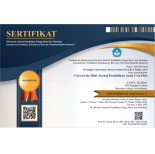How Fitrah Based Education Predict Parent-Child Relationships in Early Childhood?
Abstract
Homeschooling in early childhood is not just learning like in formal school, but also doing many different activities to stimulate children's development. When homeschooling starts, parents are required to be involved and maintain a relationship with their children. One approach that can be used in carrying out learning activities from home is Fitrah-Based Education (FBE). This study aims to look at the role of FBE in the relationship between parents and children. This study uses a mixed method with a cross-sectional design. Data was collected using a reflection of Child-Parent Relationships Scale (CPRS) filled out by parents and observations via social media Instagram and Qur’an Based Play’s community WhatsApp groups. Quantitative data analysis uses correlation and linear regression techniques, qualitative data analysis uses observation recording techniques. The results show that the routine of various Fitrah-based education activities can predict parent-child relationships (p-value <0.05) by 9.3% on the conflict dimension and 8% on the closeness dimension. This research can be useful for parents at home and the community of Fitrah-based education activists in general. The limitation is a threat to external validity.
Keywords
Full Text:
PDFReferences
Annissaniwaty, M., Pertiwi, N.I., Widyastuti, L., Isnandari, A.F., & Kartika, A.I. (2023). Student’s self-regulation aged 11-12 years old in school that implemented fitrah-based education. Psikoislamedia Jurnal Psikologi, 8(1), 59-68.
Astuti, M. (2017). Fitrah-Based education. JMIE: Journal of Madrsah Ibtidaiyah Education, 1(1), 80-94.
Bakhtiar, A., Webster, E., & Hadwin, A. F. (2018). Regulation and socio-emotional interactions in a positive and a negative group climate. Metacognition and Learning, 13(2). DOI: DOI:10.1007/s11409-017-9178-x.
Edward, C.P., Sheridan, S.M., & Knoche, L.L (2010). Parent-Child relationships in early learning. International Encyclopedia of Education (Oxford, England: Elsevier, 2010), volume 5, pp. 438-443.
Ferreira, T., Cadima, J., Matias, M., Leal, T., & Matos, P. M. (2021). Teacher-child dependency in preschool: Links with teacher-child closeness, conflict and children’s effortful control. Attachment & Human Development, 23(5), 540-555.
Fitri, R. S. A., Hafidhuddin, D., Indra, H., & Husaini, A. (2024). Fitrah and fitrah-based children's education concept in the digital era: The perspective from Al-Qur'an and Hadith. International Journal of Islamic Thought and Humanities, 3(1), 126-141.
Fitria, R., & Djoehaeni, H. (2023). Development of early childhood student agency in efforts to realize free play (case study of the aksi pasukan hepi program at TK Negeri Pembina Subang). Cakrawala Dini: Jurnal Pendidikan Anak Usia Dini, 14(2), 73-80.
Haslam, D., Poniman, C., Filus, A., Sumargi, A., & Boediman, L. (2020). Parenting style, child emotion regulation and behavioral problems: The moderating role of cultural values in Australia and Indonesia. Marriage & Family Review, 56(4), 320–342. DOI: https://doi.org/10.1080/01494929.2020.1712573
Jarvis, J.A., Gibby, A. L., Dufur, M. J., & Pribesh, S. (2020). Family structure and child well-being in a Non-western Context: The role of parent-child relations and parental conflict in South Korea. Population Research and Policy Review, 39(3).
Kunzman, R., & Gaither, M. (2020). Homeschooling: An updated comprehensive survey of the research. Other Education: The Journal of Educational Alternatives, 9(1), 253-336. https://www.researchgate.net/publication/374195331_Homeschooling_An_Updated_Comprehensive_Survey_of_the_Research
Lanjekar, P.D., Joshi, S.H., Lanjekar, P.D., & Wagh, V. (2022). The effect of parenting and the parent-child relationship on a child's cognitive development: A literature review. Cureus 14(10). DOI: 10.7759/cureus.30574
Maesyaroh, A., Aryanti, D., Hayati, E., & Fahrul SK, A. (2022). Urgensi pemahaman tahapan pendidikan fitrah persfektif fitrah based education karya Harry Santosa. Al Afkar: Journal for Islamic Studies, 5(3), 157-172.
Muniroh, M. (2019). Fitrah Based Education: Implementasi manajemen pendidikan berbasis fitrah di TK Adzkia Banjarnegara. Manageria: Jurnal Manajemen Pendidikan Islam, 4(2), 241-262.
Murhayati, Hayati, M., Irma, A., & Marzuqo, K. (2023). The influence of fitrah based learning on strengthening the character of students. POTENSIA: Jurnal Kependidikan Islam, 9(1), 106-116.
Nersehan, Husnaini, N., & Murniati, W. (2022). Konsep fitrah based education pada pendidikan anak usai dini. Islamic EduKids: Jurnal Pendidikan Anak Usia Dini, 4(2), 99-110.
Noor, F.A., & Sari, A.R. (2022). Impact of practical life on Montessory method on the concentration of children in TK PKK Bhakti Tamanan. Cakrawala Dini: Jurnal Pendidikan Anak Usia Dini, 13(2), 91-98.
Nuhla, A., Sutarto, J., & Budiartati, E. (2020). Parents perspectives and decisions toward homeschooling for early childhood (a study at Charlotte Mason Indonesia community). Journal of Primary Education, 9(2), 136-143. https://doi.org/10.15294/jpe.v9i2.36179
Popov, L.M., & Ilesanmi, R.A. (2015). Parent-child relationship: Peculiarities and outcome. Review of European Studies, 7(5), 253-263. DOI:10.5539/res.v7n5p253.
Putra, M. M., Andani, F., Fransiska, J., & Hairani, P. (2020). Menumbuhkan fitrah keimanan (Kajian konsep fitrah based education). Zuriah: Jurnal Pendidikan Anak Usia Dini, 1(1), 37 – 48.
Ramadhani, C.R., Kadarisman, A., & Soedewi, S. (2021). Perancangan buku storytelling untuk orangtua muslim sebagai media pendidikan seksual kepada anak dengan teori fitrah based education (Studi kasus di Banten). E-Proceeding of Art & Design, 8(6), 2532 – 2538.
Razi, A. (2016). Homeschooling: An alternative education in Indonesia. International Journal of Nusantara Islam, 4(2), 75-84. https://dx.doi.org/10.15575/ijni.v4i2.973. https://journal.uinsgd.ac.id/index.php/ijni/article/view/973/pdf_79
Sulaimawan, D., & Nurhayati, S. (2023). Fitrah-Based parenting education training to improve parents' knowledge of nurturing children’s fitrah in the digital age. Kawanua International Journal of Multicultural Studies, 4(1), 59 – 68.
Susanto, Syaidah, K., & Hamiyya, I.R. (2023). Organizing the humanistic curriculum with the concept of fitrah-based education. INTEGRATIA: Journal of Education, Human Development, and Community Engagement, 1(1), 1-19.
Yuliandari, N., & Suryana, D. (2022). The role of parents in early childhood's emotional social development. Cakrawala Dini: Jurnal Pendidikan Anak Usia Dini, 13(1), 41-48.
Yunita, Y., Utami, D.T., Nisa, K., & Rofi’atun, S. (2023). Internalisasi nilai-nilai akhlak aktual melalui fitrah based education (FBD) bagi siswa kelas 1 SDIT Tahfizh Al-Fatih Pekanbaru. GENERASI EMAS: Jurnal Pendidikan Islam Anak Usia Dini, 6(2), 10-16.
DOI: https://doi.org/10.17509/cd.v15i2.69813
Refbacks
- There are currently no refbacks.
Copyright (c) 2024 UPI Kampus Cibiru

This work is licensed under a Creative Commons Attribution-ShareAlike 4.0 International License.
Cakrawala Dini: Jurnal Pendidikan Anak Usia Dini
Published in collaboration Program Studi PGPAUD UPI Kampus Cibiru, APG PAUD Indonesia, and PPJ PAUD Indonesia

Cakrawala Dini: Jurnal Pendidikan Anak Usia Dini is licensed under a Creative Commons Attribution-ShareAlike 4.0 International License.
Based on a work at https://ejournal.upi.edu/index.php/cakrawaladini.















